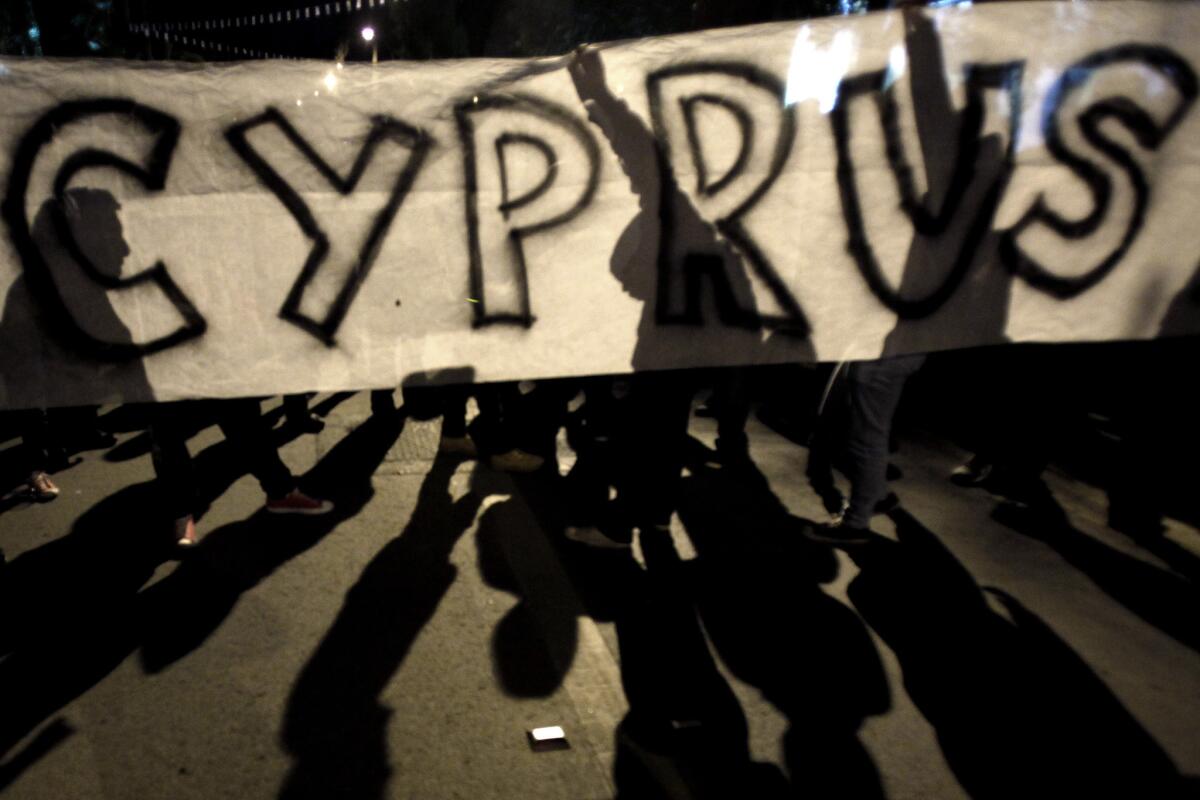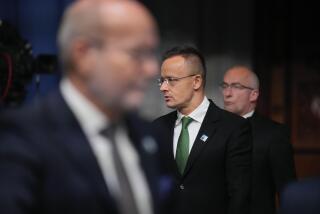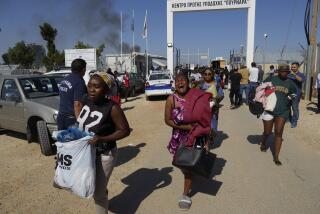Cyprus locked in tense talks with international lenders

- Share via
ATHENS -- Officials from Cyprus and international lenders were locked in long and tortuous talks Sunday, trying to strike a deal on a rescue plan that would keep the island’s failing banks from collapsing while maintaining membership in Europe’s single currency.
Information seeping out of the talks was both confusing and conflicting. Still, as of late Sunday, officials from the island republic, the European Union and the International Monetary Fund showed no sign of a breakthrough, delaying an urgent meeting in Brussels of finance ministers of the 17 nations that use Europe’s single currency.
Failure to seal a deal will on Monday force the European Central Bank, according to an ultimatum it issued, to stop funneling billions of dollars into Cyprus’ cash-strapped financial system, leaving the tiny island to fend for itself.
“It’s looking very difficult,” Nicos Anastasiades, the president of Cyprus, told his Cabinet council and the country’s political leaders in a brief conference call hours into the talks. “The pressure is so immense that I told them that I will walk out and resign.”
The island’s political leadership remained on standby at the presidential mansion in Nicosia, ready to afford Anastasiades immediate approval -– or rejection -- of a new bailout scheme.
To avoid bankruptcy, Cyprus needs to raise $7.5 billion to qualify for about $13 billion in international aid which its European peers and the IMF have pledged to finance. Initial plans to raise that amount by a one-time levy of up to 10% on bank deposits backfired last week, igniting fierce public reaction and failure to garner a single vote of support in the Cyprus parliament.
Faced, however, with no other viable options, the government in Cyprus moved within hours to reconsider the initial deal as the prospect of a chaotic default and an exit from the European single currency loomed ominously over the island.
Under one of the proposals bandied about by Nicosia, depositors would face a blanket tax of 4% on their savings; wealthy depositors with accounts of more than $130,000 at the Bank of Cyprus, the island’s biggest lender, would be assessed a one-time 20% fee.
“Whatever the final details are of the final plan, one things is certain,” Alexandros Apostolides, a senior analyst, said. “It’s not only worse than what was initially put forward a week ago, but Cyprus altogether is.”
Although a small economy accounting for 0.2% of the Eurozone’s economic output, Cyprus’ entry to the EU in 2004 and its adoption of the euro four years later aimed to put it on the path of stability and prosperity. The European debt crisis, though, shattered that dream: Banks suffered huge loses because of their exposure to Greek bonds.
Its reliance, also, on shadowy Russian money also turned it into the latest country to require a rescue bailout to avert bankruptcy.
A lawyer by profession, Anastasiades was voted into office last month on a pledge to block unprecedented designs by Germany, Europe’s paymaster, to cream off money from private deposits – a move that spooked markets and analysts across Europe for fear of setting a dangerous precedent.
Even if a deal is reached in Brussels, the new formula must be approved by the 56-seat parliament, which on Friday pushed through a rash of emergency regulations, including the restructuring of shaky banks, the creation of a solidarity fund to manage state assets and extraordinary capital controls to avert massive outflows of deposits when banks open on Tuesday.
With their livelihoods in the balance, Cypriot businesses were no longer accepting bank and credit cards over the weekend, insisting on cash. ATMs on Sunday were reprogrammed to restrict daily withdrawals to $130, down from the $336 limit the island’s central bank announced ahead of the weekend.
“If we’re heading for bankruptcy,” said Archbishop Chrysostomos, the island’s chief prelate after Sunday Mass, “then perhaps we are better off just going it alone.”
ALSO:
Police battle same-sex marriage foes in Paris
Maliki resists Kerry’s call to halt flow of Iranian arms to Syria
Rebels topple Central African Republic president, seize capital
More to Read
Sign up for Essential California
The most important California stories and recommendations in your inbox every morning.
You may occasionally receive promotional content from the Los Angeles Times.












